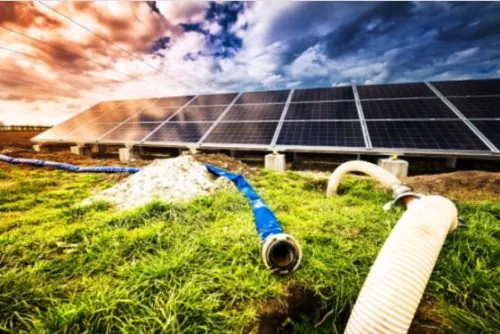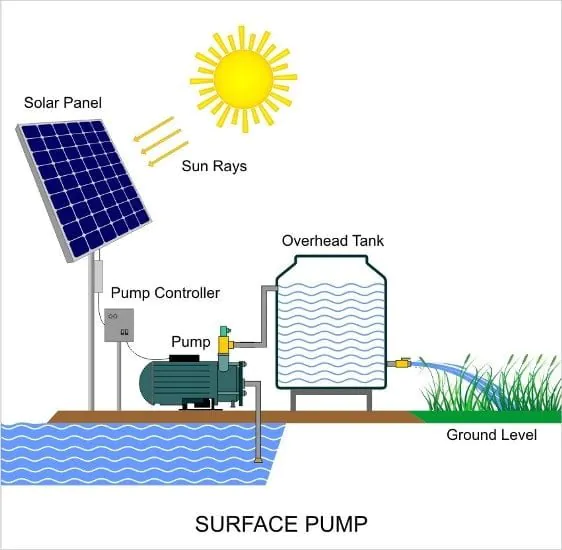7.5 HP Solar Water Pumps & Best Price with Brands
1. What are 7.5 HP Solar Water Pumps?
A 7.5 HP solar water pump is a type of pump that utilizes solar energy to pump water from a source to its desired destination. These pumps are specifically designed to efficiently convert solar power into mechanical energy, allowing them to deliver a reliable water supply without relying on conventional energy sources like electricity or diesel. By harnessing the abundant and renewable energy of the sun, these pumps offer an eco-friendly and cost-effective solution for various water pumping needs.
2. How to Do 7.5 HP Solar Water Pumps Work?
7.5 HP solar water pumps utilize photovoltaic (PV) technology to generate electricity from sunlight. The pump's solar panels capture sunlight and convert it into direct current (DC) electricity. This DC electricity is then sent to a controller, which regulates the power flow and charges the battery storage system. The stored energy in the batteries is then used to power the pump, which delivers water from the source to its destination.

The pump's motor is designed to operate using DC power, eliminating the need for an inverter to convert DC to alternating current (AC). This direct power transfer ensures higher efficiency and reduces energy losses. Additionally, some 7.5 HP solar water pumps feature advanced motor and pump designs that optimize performance and maximize the amount of water delivered per watt of solar power.
7.5HP Solar Pump Price
| Solar Water Pump | Selling Price | Price Per HP |
|
Rs. 4,55,000 |
Rs. 60,500 |
|
|
AC Submersible Solar Pump |
Rs. 4,25,000 |
Rs. 56,500 |
|
AC Surface Solar Pump |
Rs. 4,10,000 |
Rs. 54,500 |
|
DC Surface Solar Pump |
Rs. 4,17,500 |
Rs. 55,600 |
|
7.5HP VFD Solar Solution |
Rs. 2,90,000 |
Rs. 38,500 |
|
Rs. 5,15,000 |
Rs. 68,500 |
|
|
Rs. 4,85,000 |
Rs. 64,500 |
3. Advantages of 7.5 HP Solar Water Pumps
Harnessing the Power of the Sun
One of the key advantages of 7.5 HP solar water pumps is their ability to harness the power of the sun, an abundant and renewable energy source. Unlike traditional pumps that rely on fossil fuels or grid electricity, solar water pumps provide a sustainable and environmentally-friendly solution. By utilizing clean energy, these pumps contribute to reducing greenhouse gas emissions and mitigating climate change.
Reduced Energy Costs and Environmental Impact
Solar-powered pumps offer significant cost savings compared to diesel or electric ones. Once installed, 7.5 HP solar water pumps operate using free solar energy, eliminating the need for ongoing fuel or electricity expenses. This makes them an excellent long-term investment, especially in areas with ample sunlight. Moreover, the use of solar power reduces dependence on fossil fuels, helping to preserve natural resources and protect the environment.
Reliable and Low Maintenance Operation
7.5 HP solar water pumps are known for their reliability and low maintenance requirements. With fewer moving parts than traditional pumps, they have fewer points of failure, resulting in increased durability. Additionally, since these pumps operate using DC power, there is no risk of motor burnout due to power surges. Routine maintenance typically involves cleaning the solar panels, inspecting connections, and ensuring proper system operation, making them hassle-free solutions for water pumping needs.

4. Applications of 7.5 HP Solar Water Pumps
Agricultural Irrigation Systems
In the agricultural sector, 7.5 HP solar water pumps play a crucial role in irrigation systems. They provide a sustainable and cost-effective solution for farmers to irrigate their crops, ensuring optimal growth and productivity. Solar water pumps can draw water from various sources such as rivers, ponds, or wells and distribute it to fields through a network of pipes or sprinklers. With their ability to operate in remote locations without access to electricity, these pumps enable efficient irrigation in off-grid areas.
Livestock Watering
For livestock farmers, providing a reliable water supply is essential for the health and well-being of their animals. 7.5 HP solar water pumps can pump water from wells, boreholes, or other sources to watering troughs or storage tanks for livestock. These pumps offer a cost-effective and sustainable solution, ensuring a continuous supply of clean water for animals, even in remote areas.
Remote Water Supply
In regions with limited access to clean water, 7.5 HP solar water pumps provide a lifeline by facilitating remote water supply projects. These pumps can be installed where grid electricity is unavailable, allowing communities to access clean water for drinking, cooking, and sanitation. Solar water pumps can efficiently lift water from wells or boreholes and store it in tanks for distribution, improving the quality of life for communities in need.
Community Water Projects
Solar water pumps are also utilized in community water projects to cater to the water needs of a larger population. Whether it's for a small village, a school, or a healthcare facility, these pumps can deliver a reliable and sustainable water supply. Community water projects can operate independently without relying on unstable or expensive grid connections by harnessing solar energy. This enhances water security and enables communities to thrive by meeting their basic water requirements.
5. Choosing the Right 7.5 HP Solar Water Pump
Selecting the appropriate 7.5 HP solar water pump requires careful consideration of various factors. Here are some key aspects to keep in mind:
Factors to Consider
-
Water Source: Determine the type and availability of the water source, such as a well, borehole, or river. This will impact the pump's design and specifications.
-
Water Requirements: Calculate your specific application's required water flow rate and pressure. This information will help determine the pump's capacity and performance.
-
Head and Flow Rates: Understand the total dynamic head (TDH) and flow rate needed to transport water from the source to the destination. These parameters influence the pump's power requirements.
-
Sunlight Availability: Assess the average daily sunlight hours in your location. This will impact the sizing of the solar panel array to ensure sufficient power generation.
Evaluating Water Requirements
To evaluate your water requirements, consider the following:
-
Daily Water Demand: Determine the amount of water needed per day, taking into account factors such as irrigation needs, livestock watering, or community water consumption.
-
Peak Water Demand: Identify any peak periods where water demand significantly increases, such as during crop irrigation or specific community activities.
-
Seasonal Variations: Consider any seasonal variations in water requirements, as different crops or community needs may arise throughout the year.
By accurately assessing your water requirements, you can choose a 7.5 HP solar water pump that meets your needs and ensures a reliable water supply.
6. Installation and Maintenance of 7.5 HP Solar Water Pumps
Proper installation and regular maintenance are vital for the optimal performance and longevity of 7.5 HP solar water pumps. Here are some essential considerations:
Ensuring Proper Installation
-
Solar Panel Placement: Install the solar panels in a location that receives maximum sunlight throughout the day. Ideally, panels should face south and be tilted at an angle corresponding to your latitude for optimal solar energy capture.
-
System Sizing: Size the solar panel array and battery storage capacity appropriately based on your water requirements, average sunlight availability, and backup needs.
-
Wiring and Connections: Ensure all electrical connections are properly made, following manufacturer guidelines and local electrical codes. This includes connecting solar panels, batteries, and the pump controller.
Routine Maintenance for Longevity
-
Solar Panel Cleaning: Regularly clean the solar panels to remove dust, dirt, or debris that may reduce their efficiency. Use a soft cloth or sponge with water or a mild detergent solution for gentle cleaning.
-
Battery Maintenance: Check the battery bank regularly to ensure proper charging and storage. Inspect for any corrosion, loose connections, or signs of damage. Follow the manufacturer's recommendations for battery maintenance.
-
Controller and Pump Inspection: Monitor the pump controller and motor for any signs of malfunction or unusual noise. Check the pump's intake and discharge lines for clogs or leaks. Address any issues promptly to avoid further damage.
Troubleshooting Common Issues
-
Insufficient Water Flow: If the water flow is inadequate, check for any clogs or obstructions in the intake or discharge lines. Clean or remove any debris that may impede the flow.
-
Inconsistent Power Supply: If the pump is not receiving sufficient power, inspect the solar panel array for shading, dirt, or damage. Ensure proper connections and wiring to avoid power loss.
-
Battery Failure: If the battery is not holding a charge or experiencing reduced capacity, it may need replacement. Consult with a professional to assess the battery's condition and make appropriate recommendations.
Proper installation, regular maintenance, and prompt troubleshooting will ensure the optimal performance and longevity of your 7.5 HP solar water pump system.
7. Comparing 7.5 HP Solar Water Pumps with Traditional Alternatives
When considering 7.5 HP solar water pumps, it's essential to compare them with traditional alternatives to understand their advantages and limitations.
Diesel-Powered Pumps
Diesel-powered pumps have been a common choice for water pumping needs, particularly in remote areas without electricity. While diesel pumps provide reliable water supply, they come with several drawbacks:
-
Fuel Dependence: Diesel pumps require a constant supply of fuel, which can be expensive and subject to price fluctuations.
-
Environmental Impact: Diesel pumps contribute to air and noise pollution, as well as greenhouse gas emissions. They have a significant carbon footprint compared to solar pumps.
-
Maintenance and Operational Costs: Diesel pumps require regular maintenance, including oil changes, filter replacements, and fuel system maintenance. These ongoing costs can add up over time.
Electric-Powered Pumps
Electric-powered pumps connected to the grid offer a convenient water pumping solution in areas with reliable electricity supply. However, they have their own set of considerations:
-
Dependence on the Grid: Electric pumps rely on grid electricity, which may not be available in remote locations or during power outages. This limits their use in off-grid applications.
-
Energy Costs: Electric pumps contribute to electricity bills, which can be substantial for heavy water pumping needs. Rising energy costs can impact long-term operational expenses.
-
Infrastructure Requirements: Installing electric pumps often involves significant infrastructure development, including electrical connections and wiring. This can be costly and time-consuming.
Comparatively, 7.5 HP solar water pumps offer a sustainable, cost-effective, and reliable alternative to traditional pumps, making them an attractive choice for various applications.
